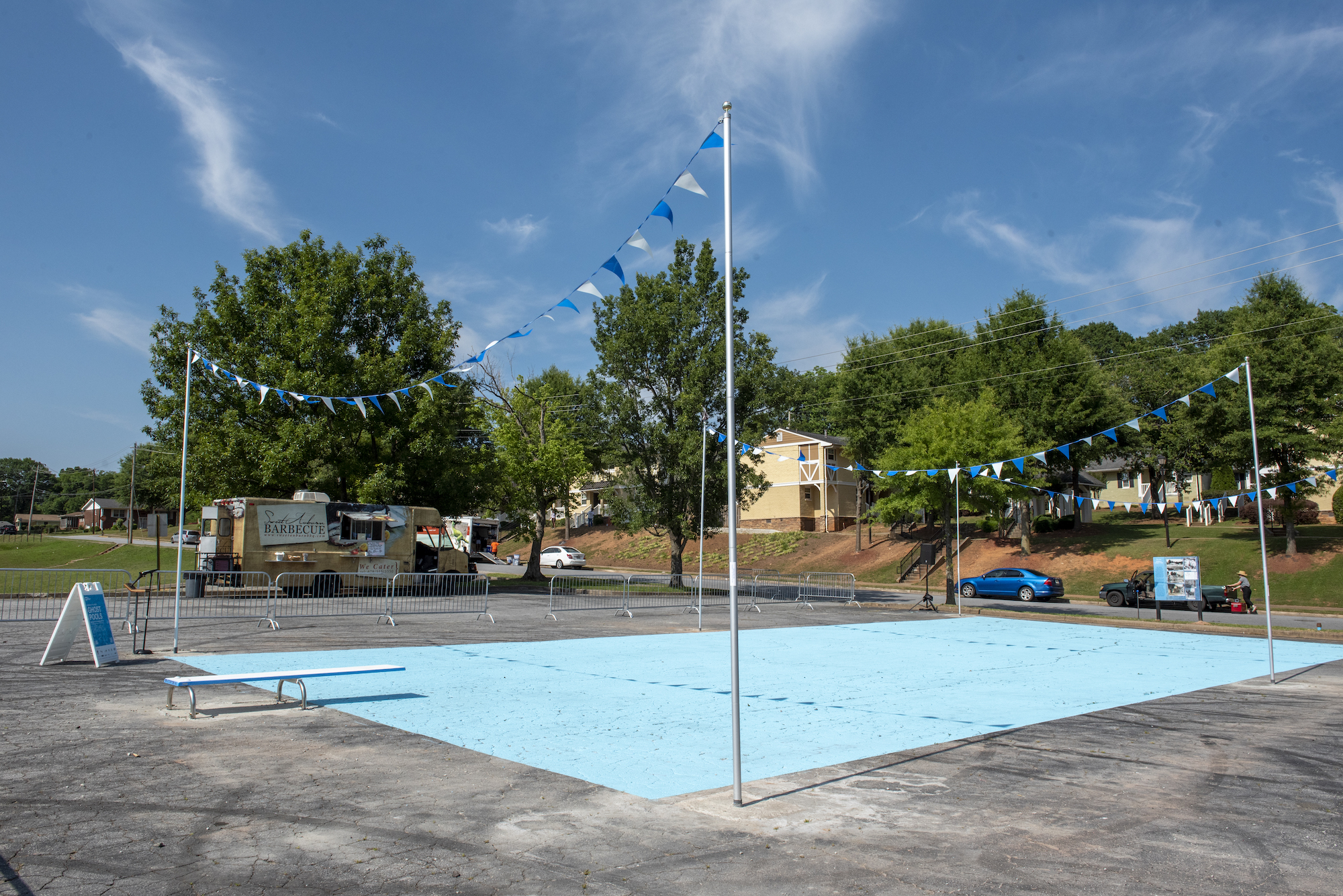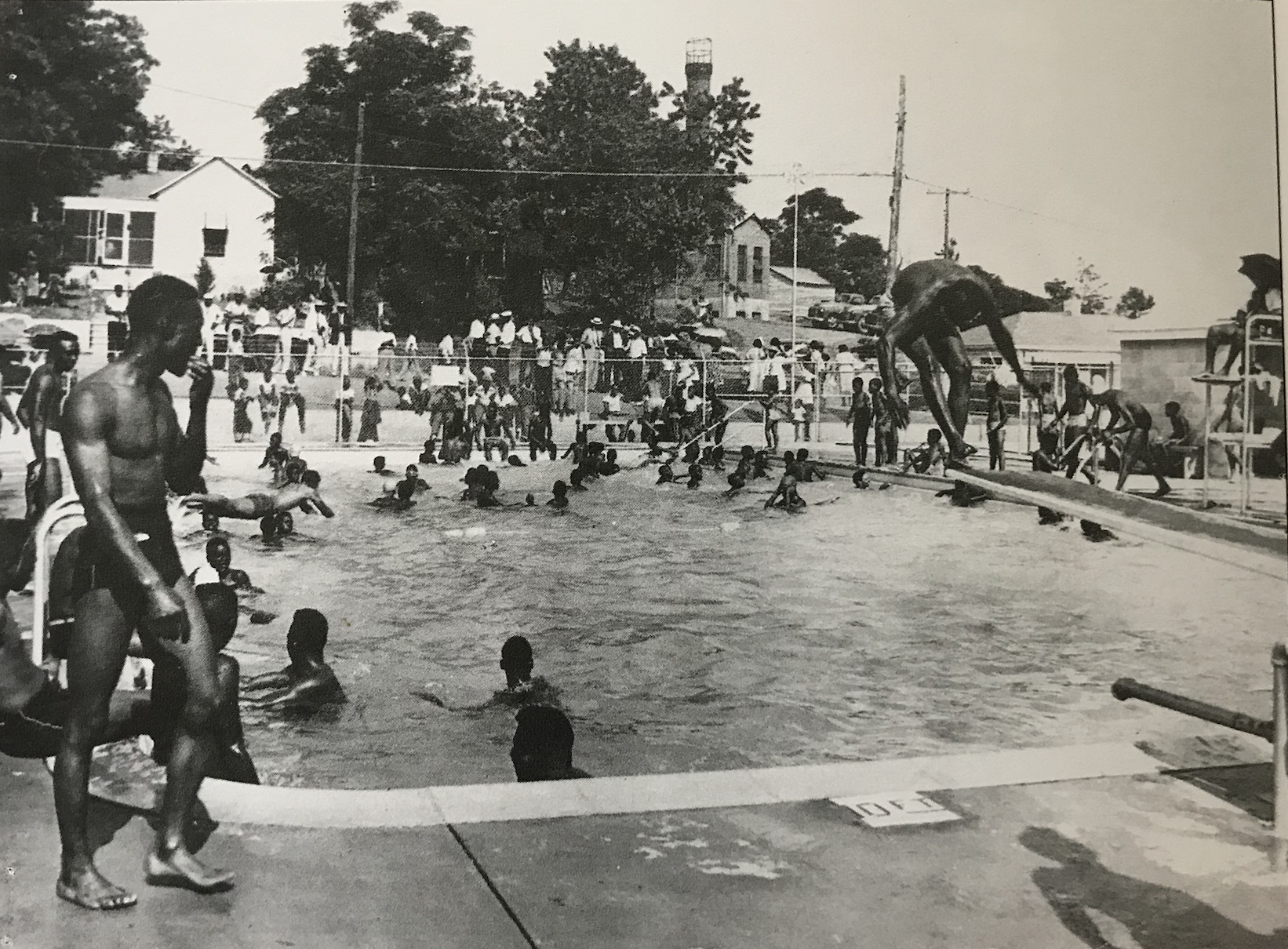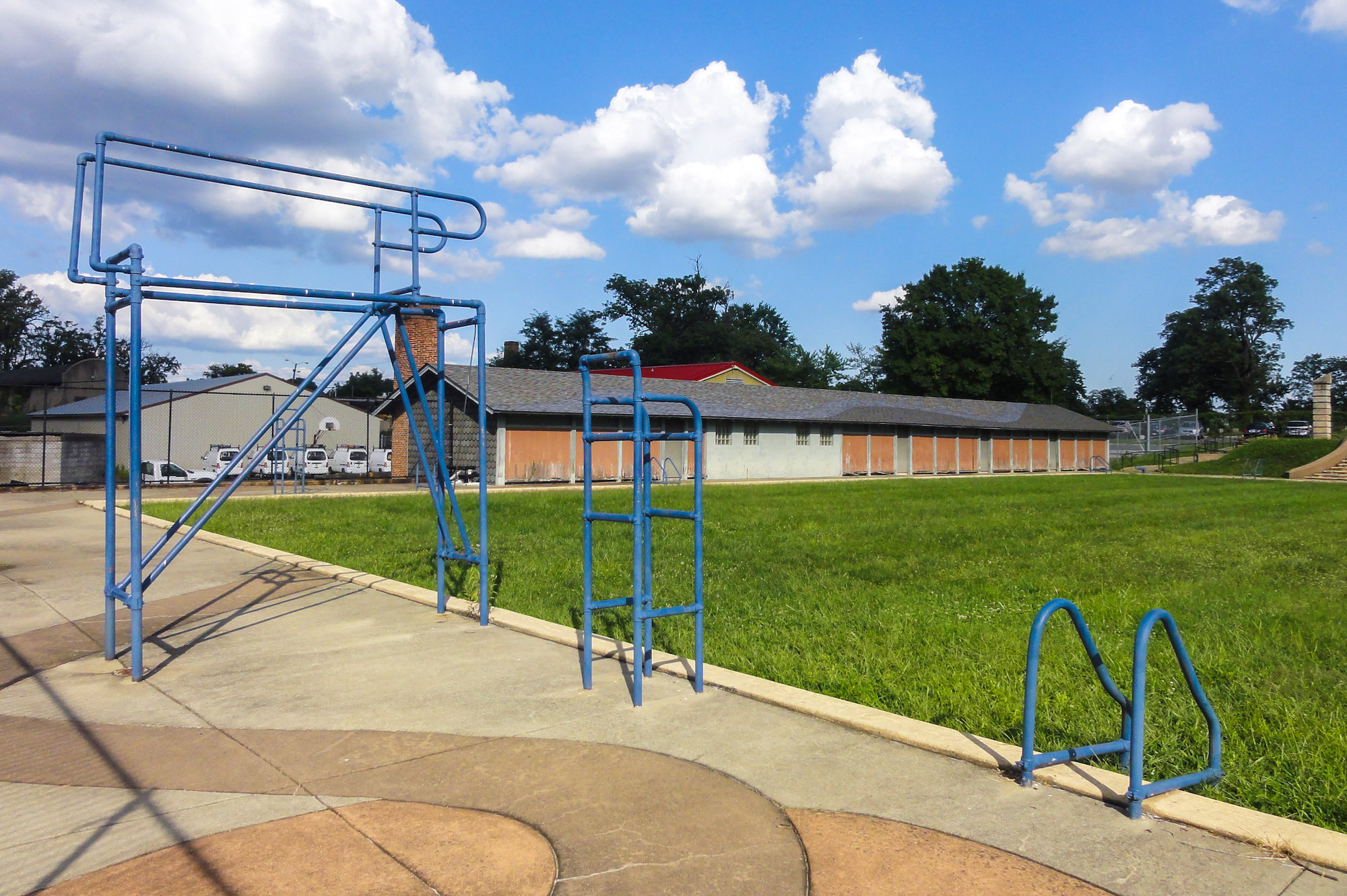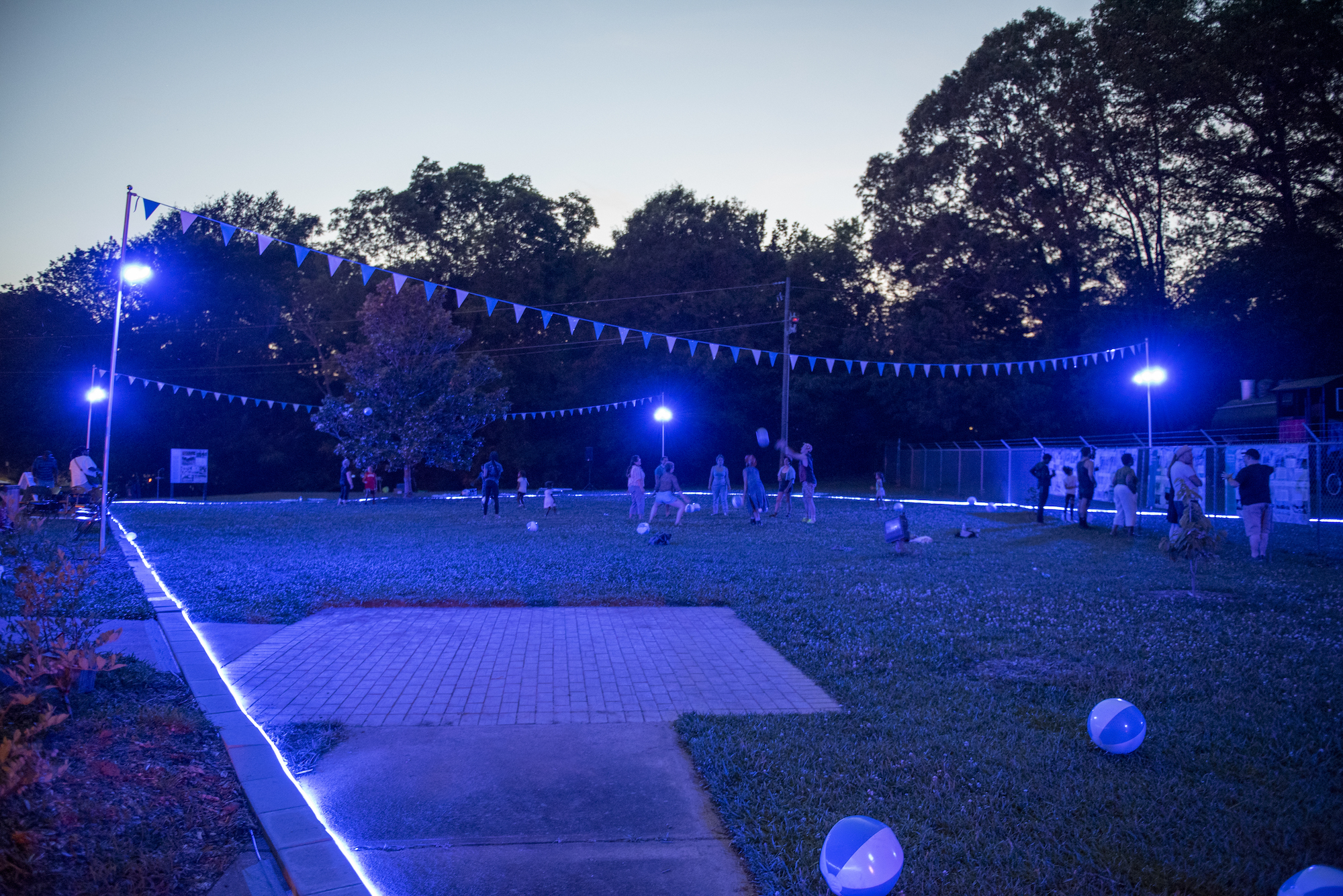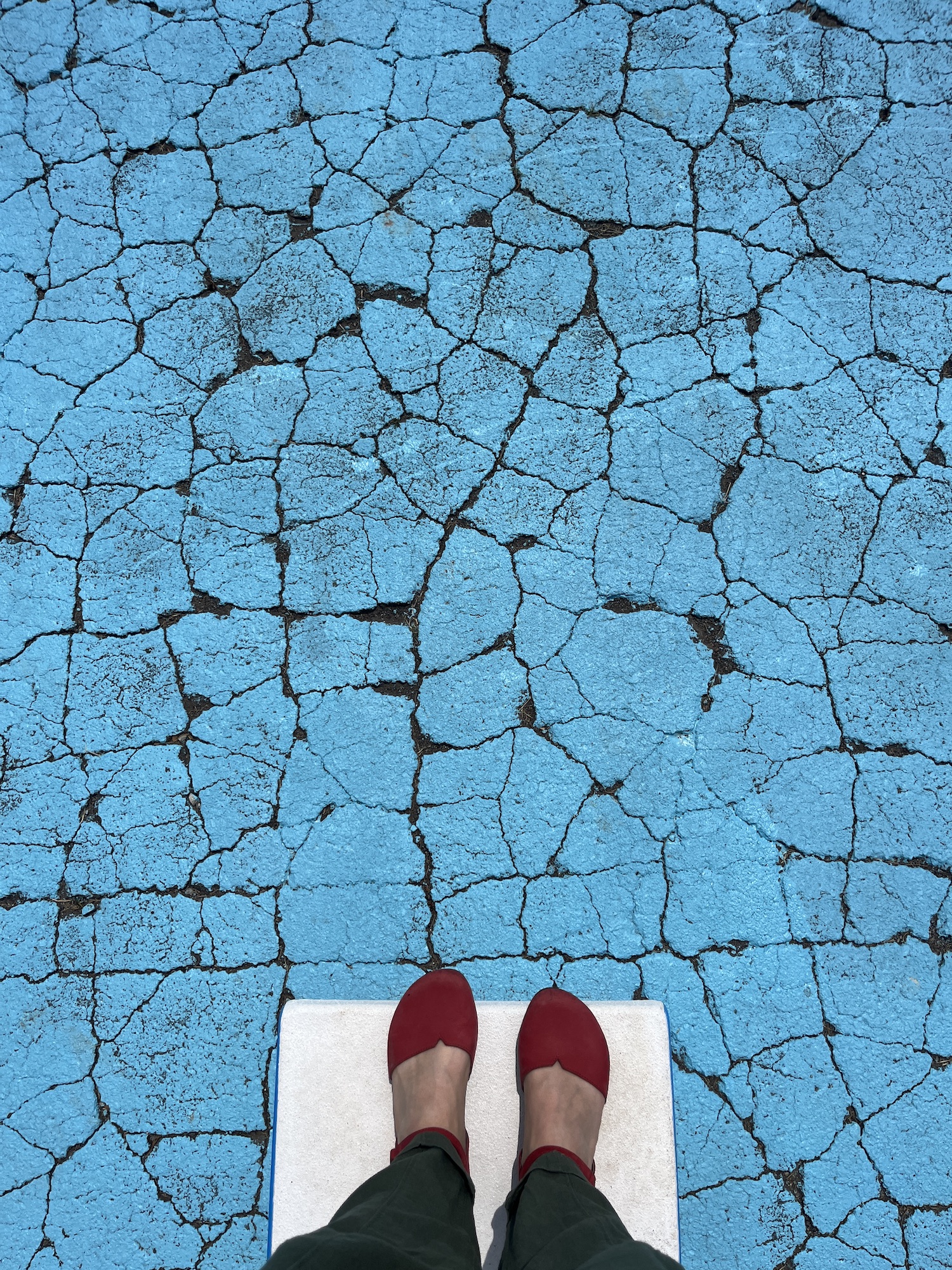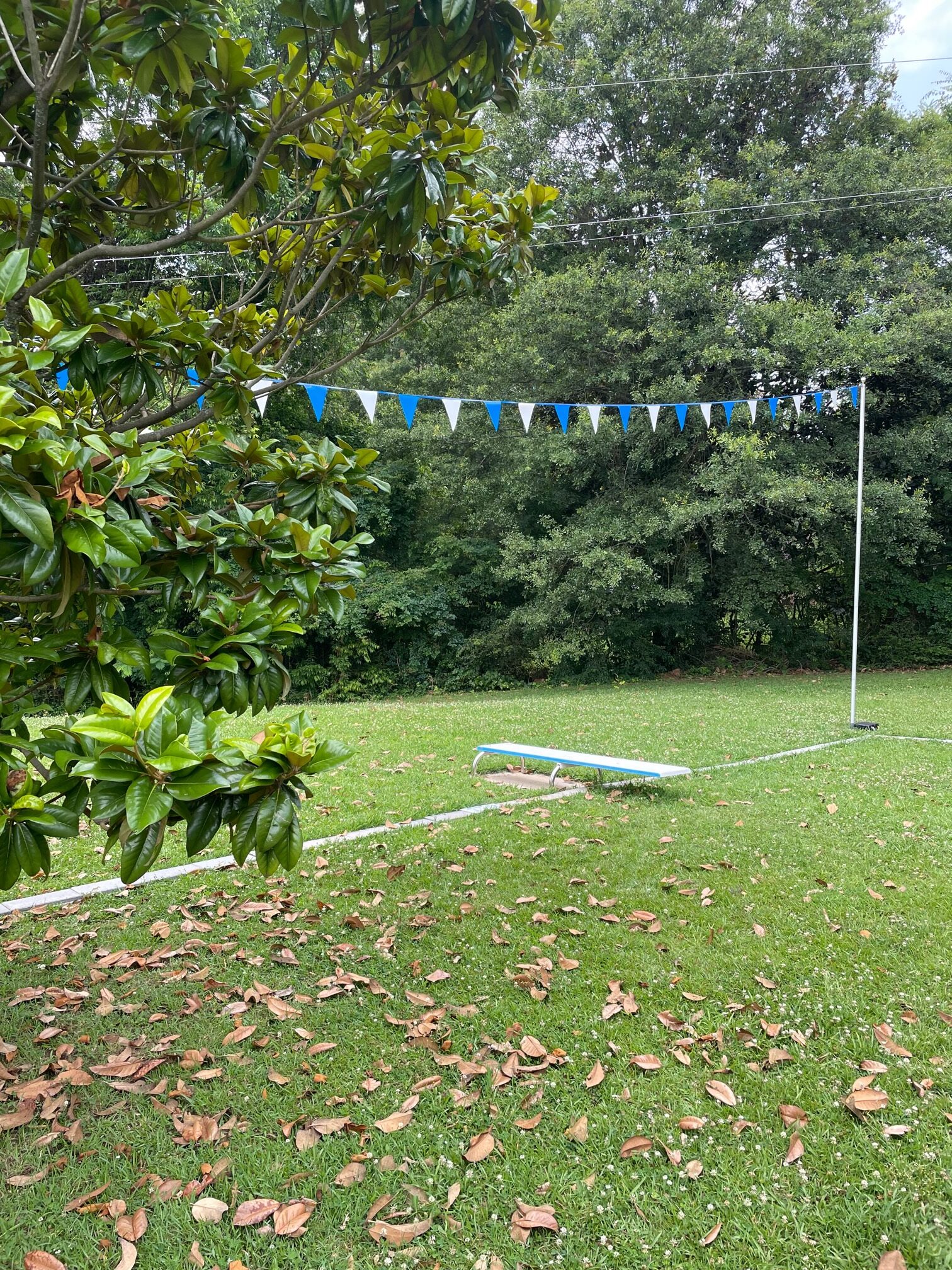Let It Flow—Hannah Palmer’s Reimagined Atlanta
Hannah Palmer, Ghost Pools, installation view, 2023 [photo: Julie Yarbough; courtesy of the artist and Flux Projects, Atlanta]
Share:
The quest that led Atlanta-based writer and urban designer Hannah Palmer to create Ghost Pools last summer in Atlanta was to find a neighborhood pool for her kids. In doing so, she discovered the history of lost pools in Atlanta and expanded her research. She learned how pools became endemic to urban blight in the Jim Crow South. Historian Jeff Wiltse’s book Contest Waters: A Social History of Swimming in America amplifies the related issues by explaining how public pools were funded, designed, sited, segregated, litigated, defunded, and ultimately abandoned. “I learned that what happened to the pool in my neighborhood was part of a pattern across the nation, a sad but common history,” Palmer writes. “What would happen,” she wondered, “if we shared an understanding of what happened to these ambitious public spaces?” Atlanta’s Ghost Pools set the stage for a community conversation.
From Memorial Day to Labor Day 2023, Palmer brought water to the surface of Atlanta’s fraught history. Ghost Pools materialized a communal narrative centered on the love and loss of summer swims in the East Point neighborhood where Palmer lives with her family. Memories are all that remain of the two East Point public swimming pools that met their end at the beginning of desegregation.
Hannah Palmer, Ghost Pools, installation view, 2023 [photo: Julie Yarbough; courtesy of the artist and Flux Projects, Atlanta]
Commissioned by Flux Projects and presented with support from the City of East Point, Palmer’s public history and art project addressed the Spring Avenue (Whites only) pool, which is now the great lawn next to the East Point Historical Society, and the erstwhile “Negro” pool on Randall Street, a few blocks away—a present-day parking lot.
Randall Street Pool [courtesy of East Point Historical Society and Flux Projects]
Since the 1960s, ghost pools have haunted cities across the US. Most became invisible, obscured by overgrowth or obliterated by new development. One notable exception is a permanent public art project in Baltimore. MacArthur Fellow Joyce J. Scott was commissioned to create Memorial Pool in 1996, to commemorate Pool No. 2 in the city’s Druid Hill Park. Built in 1921, the segregation-era pool served more than 100,000 African Americans in Baltimore. Abandoned and long ago filled with dirt, the historic site is now covered with grass and framed by cobalt blue ceramic tiles. Marble steps, pool stair railings, and curving walkways create a landscape of memory.
Joyce J. Scott, Memorial Pool, installation view, 1999 [photo: Graham Coreil-Allen; courtesy of the artist and Graham Projects grahamprojects.com]
In East Point, Palmer marked the original pool footprints with pool tiles she salvaged from an abandoned pool in Marseilles, France; flags; paint; and diving boards. On each site, large informational signs featuring archival photos presented a timeline from the 1800s to today, highlighting key moments from local and national swimming pool histories. Accessible by mobile phone, sounds recorded at local public pools brought joyous laughter and splashing to the experience.
The multimedia display evoked a full range of emotions. Images and text conveyed visible pleasure in shared public spaces, but also racist confrontations, violence, neglect, and, finally, a few rays of hope.
Atlanta’s temporary Ghost Pools invited public engagement and sparked important conversations with residents. Oral historian Ann Hill Bond set up a plein air recording studio on site, and locals were invited to share personal memories of the pools. Widely covered in the media, the project directed the entire city’s attention to ongoing inequities in public access to pools.
Hannah Palmer, Ghost Pools, installation view, 2023 [photo: Julie Yarbough; courtesy of the artist and Flux Projects, Atlanta]
Ghost Pools, is just one of Palmer’s environmental justice endeavors. She became deeply involved early on with Finding the Flint, a 2017 campaign launched by American Rivers alongside partners at The Conservation Fund and the Atlanta Regional Commission. The ambitious environmental effort aims to restore the hidden headwaters of Georgia’s Flint River. Palmer’s 2017 book, Flight Path: A Search for Roots beneath the World’s Busiest Airport, documents lost neighborhoods around Atlanta’s Hartsfield-Jackson International Airport. She has worked with other environmentalists to spark activism around Atlanta’s waterways by establishing Atlanta Creek League, a neighborhood initiative focused upon cleaning up the dozens of creeks and streams that flow into Atlanta’s Chattahoochee, Flint, and South River basins. With the tagline “Play for Your Creek,” the effort models itself after a baseball league—inviting locals to rally around their natural resources. According to Palmer, the teams, branding, jerseys, and friendly competition have turned neighbors into advocates and stewards who work to improve Atlanta’s water for everyone.
As part of Atlanta Design Festival 2023, Palmer and local landscape architect and educator Carley Rickles led Walking on Earth: Southeast Atlanta Public Walk, an urban hike through Atlanta’s South River watershed. The path they took imagined a radical new trail experience for Atlanta—“a path devised [for participants] to experience the culturally rich and ecologically diverse tapestry of the city on foot.” Realized with partners from Marseille, the all-day walking tour was the culmination of a three-day Metropolitan Trails workshop. Presented by Villa Albertine, an initiative of the French Ministry for Europe and Foreign Affairs, with support from the Ministry of Culture and Atlanta partners, City/Cité—Towards Earthly Cities invited local and international artists, urbanists, architects, and students to consider possible futures through the lens of urban ecology .
Hannah Palmer, Ghost Pools, installation view, 2023 [photo: Julie Yarbough; courtesy of the artist and Flux Projects, Atlanta]
Hannah Palmer, Ghost Pools, installation view, 2023 [photo: Geoffrey Smith; courtesy of the artist and Flux Projects, Atlanta]
Atlanta, Hannah Palmer suggests, is a fertile site for sustainable change. Ghost Pools, Finding the Flint, Atlanta Creek League, and Walking on Earth propose direct actions to counter the erosion of our natural and cultural resources. They are real-life, research-based interventions at the intersection of land, water, and community. Grounded in public history and hope, each of them articulates the primacy of acting with intention to reveal the far-reaching potential of creative civic engagement.
UPDATE: Installation has been extended at Spring Avenue location
